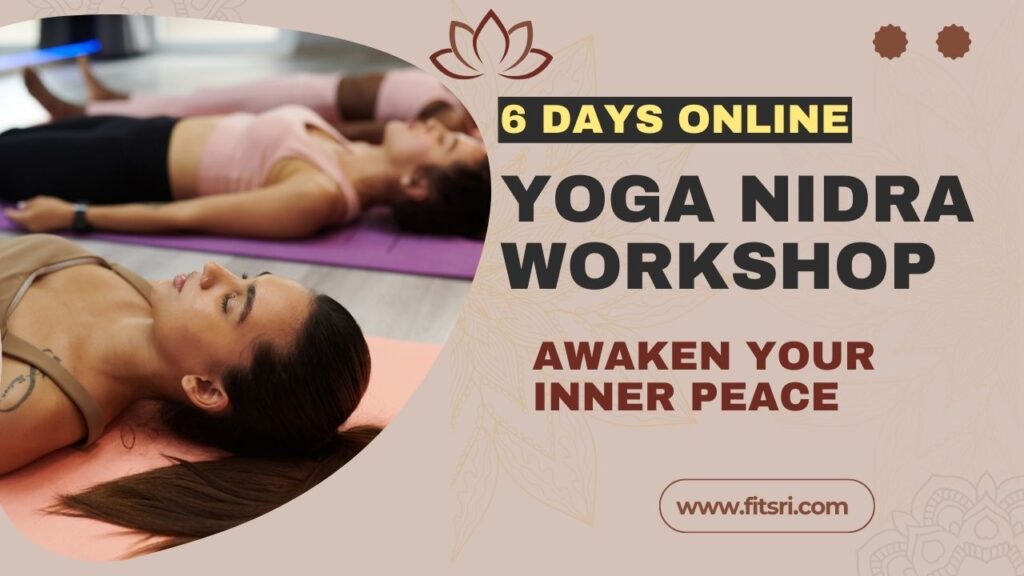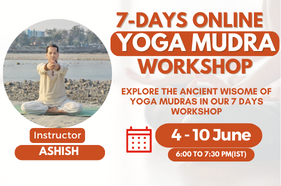
Yoga Nidra, also known as psychic sleep or yogic sleep, is a deep relaxation and guided meditation technique designed to reduce stress, anxiety, and insomnia. Practised lying down, it guides the mind through eight structured stages to reach a calm, restful state between wakefulness and sleep.
This ancient technique is especially beneficial for people dealing with high stress, hypertension, sleep issues, and emotional fatigue. It helps relax the nervous system, restore energy, and improve overall mental clarity.
Our 6-day online Yoga Nidra workshop offers both the experience and the understanding behind this practice. It is ideal for:
- Yoga teachers and therapists
- Hatha yoga and pranayama practitioners
- Holistic healers and meditation guides
You’ll learn how to practice and teach Yoga Nidra in a traditional way, based on the Bihar School of Yoga system, and how to integrate its healing benefits into your personal or professional work.
6-Day Online Yoga Nidra Workshop Highlights
Theory Exploration: Unlocking the Wisdom of Yoga Nidra
Led by senior teacher Sushant Pandey and Manisha, this online Yoga Nidra workshop offers a detailed understanding of the yogic science behind this practice. Each theory session connects traditional teachings with modern applications to help participants grasp how and why Yoga Nidra works.
1. Understanding Pratyahara
Learn how Pratyahara — the withdrawal of the senses forms the base of Yoga Nidra practice. Discover how turning inward helps the mind settle and prepares the body for deep rest, paving the way for subtler meditative experiences like Hridayakasha Dharana (Heart Space Meditation), where awareness expands inwardly.
2. The 8 Stages of Yoga Nidra
Explore each stage of Yoga Nidra in detail. Understand how the process unfolds step-by-step — from body awareness and breath observation to sensation, visualization, and the experience of inner space (Chidakasha Dharana). This journey guides practitioners toward complete relaxation and expanded consciousness.
3. Scientific and Therapeutic Benefits
Dive into the psychological and therapeutic effects of Yoga Nidra. Learn how each stage helps regulate the nervous system, reduce stress, improve sleep, and support emotional healing—backed by both traditional and scientific views.
4. Foundations of Teaching Yoga Nidra
For yoga teachers and therapists, gain clear guidance on how to structure and lead a Yoga Nidra session safely and effectively. Learn how to hold space, cue with awareness, and integrate techniques such as Hridayakasha Dharana and Chidakasha Dharana for different needs and levels of practitioners.
Practical Sessions: Experiencing Yoga Nidra in Action
Each day, you’ll take part in a 75-minute live online Yoga Nidra class. These practical sessions help you directly experience what is discussed in the theory, bringing learning to life.
1. For All Levels of Practice
Whether you’re new to Yoga Nidra or already teaching meditation, these classes are suitable for all. The experience will deepen your personal connection to this practice.
2. Guidance for Yogis and Beyond:
These live Yoga Nidra sessions offer practical guidance for professionals in wellness, yoga therapy, and mental health. Learn how to apply Yoga Nidra for stress relief, trauma healing, and more.
3. The Essence of Yoga Nidra:
Experience Yoga Nidra as it is traditionally taught a powerful relaxation technique rooted in Raja Yoga and based on Pratyahara, the stage before true meditation.
4. Harmonizing Body and Mind:
Let go of thoughts and emotional patterns. Yoga Nidra helps you enter a calm, healing state close to sleep but filled with awareness often called the hypnagogic state.
5. Ancient Roots: The Sanskrit Connection:
Discover the deep meaning behind the name “Yoga Nidra” where Yoga means union and Nidra means sleep. Learn about the ancient tantric practice of Nyasa, which uses mantras to awaken inner energy.
6. Systematic Withdrawal:
Explore the systematic withdrawal of awareness from the entire body to specific parts, both externally and internally. As awareness turns inward, witness the unfolding of visualization and meditation—a practice often referred to as psychic sleep.
7. Pratyahara in Action:
Witness the state between sleep and wakefulness, marking Yoga Nidra as a technique of Pratyahara. Experience the withdrawal of awareness from external sensorial experiences, unlocking a state of deep internalization.
Embark on this transformative journey, bridging theory and practice, and unlocking the profound potential of Yoga Nidra in harmonizing mind, body, and spirit
What Will You Learn in This Yoga Nidra Workshop?
In this 7-day Yoga Nidra online class, you’ll be guided step-by-step through the traditional eight stages of the practice. Each stage is designed to bring deep relaxation, emotional balance, and mental clarity.

- Preparation: In the initial stage, the practitioner assumes the shavasana (corpse pose). Properly executed, this pose helps eliminate bodily discomforts, facilitating maximum physical relaxation. Through various techniques, awareness is internalized, disconnecting from stress-inducing thoughts and immediately connecting with the present experiences of the body and mind.
- Sankalpa: Once awareness is internalized, practitioners are prompted to formulate a positive and straightforward resolve. Choosing a positive resolve and mentally repeating it during Yoga Nidra leaves a profound impression on the subconscious mind, directing mental energies positively.
- Rotation of Awareness: In the third stage, practitioners are guided to rotate awareness through different parts of the body along a fixed and systematic route. This systematic rotation not only deeply relaxes body parts but also the mind, emphasizing conscious awareness with body parts to establish a deeper connection and induce relaxation.
- Breath Awareness: The fourth stage enhances awareness of breath, inducing deep physical and mental relaxation. It provides the mind with support to remain aware and rooted in the present moment. Various breath awareness techniques are employed to strengthen concentration without creating tension.
- Creating Opposite Sensations/Feeling: In this stage, practitioners are trained to create opposite sensations or feelings while remaining non-involved. Starting with simple physical sensations, the practice progresses to more emotionally laden opposite feelings. Throughout, practitioners are asked to remain observers, releasing pent-up emotions associated with feelings and enhancing the ability to withstand them in real-life situations.
- Visualization: The sixth stage involves various visualization techniques, ranging from simple random objects to healing, story, or daily routine visualization. Visualization enhances photographic memory, relaxes the mind, promotes body healing, and improves learning outcomes.
- Sankalpa: After visualization, the stage of Sankalpa is repeated, deepening the impressions of resolve while still in a state of deep relaxation. This repetition is akin to irrigating the seed of Sankalpa through reaffirmation.
- Externalization: Graduating through the explained stages, practitioners are guided to reorient their senses towards external surroundings, facilitating a smooth transition out of deep relaxation without disorientation.
Is This Workshop Right for You?
This training is best suited for:
- Intermediate to advanced yoga practitioners
- Yoga teachers and meditation facilitators
- Wellness coaches and holistic therapists
- Anyone interested in guided Yoga Nidra online classes based on traditional methods
By the end of this workshop, you’ll not only experience the power of Yoga Nidra but also gain confidence in integrating it into your teaching or self-practice.
Meet Program’s Instructor

Manisha Pandey
Manisha is a Yoga Instructor and practitioner. Having completed her master’s degree in both English and Yoga, she is also a graduate in Music and Education. Currently, she teaches at various Yoga Schools in Rishikesh. Manisha specializes in conducting Yoga Philosophy, Pranayama, and Meditation classes, incorporating Yoga Nidra, Mantra chanting, and other traditional meditation techniques sourced from authentic Indian traditions.
She integrates techniques from the renowned Bihar School of Yoga, known for its authentic and practical approach to teaching worldwide. In addition, Manisha is a lifelong learner who guides a group of students to experience Yoga as a pathway to self-discovery. To date, she has taught students from around the world, who continue to carry forward the legacy of yoga in their respective countries.
Sushant Pandey, Masters in Yoga Psychology from Bihar School of Yoga

Sushant is a postgraduate in Yoga Psychology (1997-99), from the World-renowned Bihar School of Yoga and worked as a Lecturer there in the same department for four years.
As a lecturer at Yoga University, Sushant had opportunities to lead practical classes on Hatha and Kundalini Yoga, traditional Meditations and Philosophy talks with specialization in Samkhya, Tantra, Kundalini and Yoga Philosophies.
With a masters in Yoga Psychology and experience in broad settings, he has a deep understanding of the philosophical, psychological and practical aspects of yogic traditions.
Sushant has been teaching globally for over 20 years. He is the former Head of Yoga at Ananda in the Himalayas and is now an independent teacher and trainer in India with a specialization in traditional Hatha Yoga, Kundalini Yoga, Pranayama (breath-work) and various traditional techniques of meditation like Yoga Nidra (A Systematic Yogic Relaxation), Chakra Shuddhi (Chakra Cleansing Meditation) and mindfulness techniques.
 As featured in
As featured in








Details of the Online Yoga Nidra Workshop
| Date | 20th to 25th November Recording available |
| Time | 6:00 pm to 7:30 pm (India) / 08:30 am to 10:00 am (EDT) |
| Medium | Zoom live video |
| Number of sessions | 6 Day Sessions, about 75 min/each |
| Your investment | ₹800/Session (Indian participants) or $16/Session (International participants) |
| Discounted Price | ₹4999 $99 |
| Bonus | Recording of the workshop available to watch later, live Q&A interaction with the teacher to ask your practice queries. |
Book Your Spot
Frequently Asked Questions
A. After you press “Book Your Spot” you will be redirected to the payment page. There you will see three payment modes available for Indian and International payments separately. Once you have paid, you will get the details about the online class in your email within a day.
In case you do not get the email from us within a day, please check your spam folder for an email from Fitsri. Or you can directly email us: contact[at]fitsri.com
Our Yoga Nidra Meditation workshop follow the Bihar School of Yoga, an authentic Indian tradition known for its systematic and holistic approach to yogic practices.
A. No, Yoga Nidra’ practice necessarily doesn’t require the use of any kind of equipment. However if one has, as equipment keep a meditation cushion, block, and bolster nearby. You may also need a notebook and pen to make your notes.
A. It is recommended that you have taken no food at least 3 hours before a yoga class. Because yoga nidra practice is not such intense as a pose (asana) class usually is, if you’re hungry, you can have some fruits and smoothies before class.
A. Yes, after each class there will be a QnA time of 15 minutes where you can ask the teacher your questions.
Absolutely! The workshop is open to all levels, providing an opportunity for beginners to deepen their understanding and experience.
Yes, the workshop is beneficial for yoga teachers, healers, and therapists to gain insights into teaching Yoga Nidra.
A. You can contact us directly at contact(at)fitsri.com for any query related to this program.

